- Home
- Janet Dailey
The Glory Game
The Glory Game Read online
JANET DAILEY
CAPTURES THE HEART
OF AMERICA!
LOOK FOR THE SPLENDID
CALDER SAGA:
This Calder Range
Stands a Calder Man
This Calder Sky
Calder Born, Calder Bred
and her spirited novels
The Rogue
Touch the Wind
The Best Way to Lose
Mistletoe and Holly
Now together in one volume!
Western Man and
Leftover Love
All available
from Pocket Books
Praise for the storytelling talents of bestselling author
JANET DAILEY
“[Dailey] moves her story ahead so purposefully and dramatically … readers will be glad they’ve gone along for the ride.”
—Chicago Sun-Times
“A page-turner.”
—Publishers Weekly
“Bittersweet…. Passion, vengeance, and an unexpected danger from the past add to the mix.”
—Library Journal
“Janet Dailey’s name is synonymous with romance.”
—Tulsa World (OK)
“Careful writing and brilliant characterizations create an engrossing read.”
—Booklist
“A master storyteller of romantic tales, Dailey weaves all the ‘musts’ together to create the perfect love story.”
—Leisure magazine
“Dailey is a smooth, experienced romance writer.”
—Arizona Daily Star
Books by Janet Daily
Calder Born, Calder Bred
Stands a Calder Man
This Calder Range
This Calder Sky
The Best Way to Lose
Touch The Wind
The Glory Game
The Pride of Hannah Wade
Silver Wings, Santiago Blue
For the Love of God
Foxfire Light
The Hostage Bride
The Lancaster Men
Leftover Love
Mistletoe & Holly
The Second Time
Separate Cabins
Terms of Surrender
Western Man
Nightway
Ride the Thunder
The Rogue
This book is a work of fiction. Names, characters, places and incidents are either the product of the author’s imagination or are used fictitiously. Any resemblance to actual events or locales or persons, living or dead, is entirely coincidental.
A Pocket Star Book published by
POCKET BOOKS, a division of Simon & Schuster, Inc.
1230 Avenue of the Americas, New York, NY 10020
www.SimonandSchuster.com
Copyright © 1985 by Janbill, Ltd.
All rights reserved, including the right to reproduce this book or portions thereof in any form whatsoever. For information address Pocket Books, 1230 Avenue of the Americas, New York, NY 10020
ISBN: 1-416-58877-9 ISBN: 978-1-416-58877-1
eISBN-13: 978-1-45164-043-4
First Pocket Books printing April 1986
15 14 13
POCKET STAR BOOKS and colophon are registered trademarks of Simon & Schuster, Inc.
Cover illustration by Mark Gerber
Manufactured in the United States of America
Part I
CHAPTER I
“Ladies and gentlemen,” the announcer’s voice boomed over the loudspeaker, resonating beyond the sparse crowd in the stands to the players and their ponies on the turf. “I want to welcome you to the final match of the Jacob L. Kincaid Memorial Cup here at the Palm Beach Polo Club. Most of you knew Jake Kincaid, a seven-goal player in his prime and a loyal supporter of polo throughout his life. He was a worthy competitor and a true ambassador of the sport. His presence will be missed.” The announcer paused before continuing, the tone of his voice lifting from its serious level. “I’d like to direct your attention to the front box seats, where the Kincaid clan has gathered.”
“Not the whole clan, George!” The shouted correction came from a stylishly slim woman seated in the Kincaid box, her ash-blond hair protected from the Florida sun by a white straw hat. Even shouting to carry to the announcer’s roofed stand atop the stadium, her voice had a cultured sound, smooth and dry, like an excellent Bordeaux. “If all of us were here, we’d fill half the stands.”
Smiling spectators who knew the family chuckled. By anyone’s standards, the Kincaids were a large family, six children in all, three boys and three girls. They’d always been a boisterous, energetic group, obviously spoiled yet possessing an engaging charm that maturity enhanced. Time had thinned the ranks of that generation; Andrew, the oldest, had died tragically in Vietnam when his helicopter landed in a minefield; and Helen had been killed two years ago in a drunk-driving accident. Of course, Andrew and Helen had left their parents a brood of grandchildren to raise, and the rest had added to the number.
Informality was part of the essence of a big family, so it seemed right that the formality of this occasion should be broken by a Kincaid. And polo, for all its prestigious facade, was an informal sport, enjoyed by an elite few who considered themselves to be part of one big polo-loving family.
“You should have brought them, Luz. We could have had a full house today,” the announcer responded.
“Next time,” the elegant woman responded. Luz Kincaid Thomas had been christened Leslie, but no one called her that anymore, and hadn’t for years. She looked thirty; an unkind eye might guess thirty-seven, but people were always surprised when she admitted she was forty-two. Her skin had a fresh and youthful glow, lightly tanned by the Florida sunshine, never overexposed to be browned into leather. Many discreetly looked, but there were no scars near the hairline to betray nips and tucks taken to correct sagging flesh.
When she was a debutante, her features had been too strikingly defined, but she had matured into a beautiful woman. Age had softened the distinctive Kincaid jaw while time brought her natural brows into style to draw flattering attention to lively brown eyes, her most attractive asset.
Her shoulder-length hair, presently tied at the nape of her neck with an Italian designer silk scarf, was that indefinable natural shade between pale blond and light brown. If her hair stylist used a rinse to enhance the lighter streaks or mask the odd strands of gray, few were the wiser.
Over the years, Luz Kincaid Thomas had acquired her own sense of style and the confidence that went with it. She had everything, not just beauty and poise, but financial security, a close family, a stable marriage, and two grown children. There were minor annoyances and vague yearnings from time to time, but basically her life had an order and meaning that she found satisfying.
“Audra Kincaid is with us today—Jake’s widow,” the announcer continued, reading from his prepared notes on the proceedings. “At the conclusion of the finals match, she will be presenting the trophy, named in her husband’s memory, to the winning team. I’m glad you could be with us today, Audra.”
Out of the corner of her eye, Luz caught the motion of her mother’s hand lifting in a casually regal acknowledgment. A scattering of applause from the small crowd followed the gesture. Audra Kincaid was very much the respected and admired matriarch, and a very handsome woman even at sixty-nine. She carried her age well; Luz supposed she had inherited her own youthful appearance from her mother.
Luz turned slightly to study her mother, seated in the canvasslung lawn chair beside her. Always so impeccably dressed for the occasion, never over- or underdoing it, this time Audra Kincaid had on a short-sleeved green sundress trimmed with white piping, with a matching jacket. It was suitable for the occasion as well as for her age, yet suffici
ently sporty so that others in slacks or bermuda shorts would feel comfortable around her. And the green was the color of growing things that says life goes on—even for a woman mourning a husband dead these last three months.
Did Audra mourn him? Luz felt a twinge of guilt for even wondering. No one could ever accuse Audra of not being a devoted wife and mother. But Luz couldn’t remember the last time she’d called Audra Mother. She remembered Audra had cried in her arms when the heart specialist informed them Jake Kincaid hadn’t survived the second stroke, but had it been with relief? Some said it was a blessing that he had died and not lingered, constantly needing care, but Luz wasn’t thinking of it in those terms. Had Audra been glad he died, glad she was at last free of all pretense? It seemed impossible that she still could have loved him.
Jake Kincaid had been the best father any girl could have; she’d been father-spoiled and mother-disciplined. He loved as he lived, generously. He loved power, polo, and women—not necessarily in that order. His various affairs with other women were never a secret for long. The Kincaid name was too well known, too socially prominent. What was hinted at in society columns was elaborated on by gossips.
Luz had learned what assignation meant when she was eleven years old, and not long afterward, she had understood the hurt and humiliation her mother suffered. Through most of her teen years, she had hated her father for what he was doing to her mother, then she had hated Audra for letting him do it, and maybe for being to blame.
She remembered the advice Audra had offered before her marriage to Drew Thomas: “Marriages are based on trust. A man will have his peccadilloes, even Drew, but you must trust he will always come back to you—his wife.”
Even though she had come to understand Audra’s reasoning, Luz still wondered how her mother truly felt, especially now that he was gone. She couldn’t ask. Any mention of Jake Kincaid’s indiscretions was forbidden, and his death hadn’t changed that. It was not discussed then, and certainly not now.
“… and now, I’d like to introduce the players who will be riding for the Black Oak team in the championship game.” The announcer’s voice intruded on Luz’s thoughts, and she shifted her attention to the huge, thickly turfed polo field, four times the size of a football field. Her glance skipped past the four helmeted riders in black jerseys and white breeches and scanned their four opponents in blue jerseys. Her pride swelled when she found the lanky rider wearing the numeral 1 on the back of his jersey: long hair, the same shade as her own, curled well over his collar, and his mallet held upright in a position of readiness.
“Where is Drew?” The question from Audra briefly distracted Luz’s attention. “He’s going to miss the start of the game.”
“He’s waiting outside for Phil Eberly and someone else from his office. They must be late.” Luz glanced in the general direction of the stadium entrance, but the familiar silvered head of her husband wasn’t in sight. “If they don’t show up soon, I’m sure he’ll come to watch the opening toss.”
“Bill Thorndyke, probably. He enjoys watching polo.”
“What?” Her concentration had returned to the field for the introduction of the next four players, lined up facing the stands in numerical order, so Luz was slow to follow Audra’s meaning. “No. Bill Thorndyke isn’t coming. It’s some new attorney who’s just joined the law firm. A woman. You remember how much hassle Drew had with the Equal Opportunity Office, so he’s giving her the royal treatment.”
She passed on the information with the degree of vagueness with which she usually regarded the inner workings of the law firm Thomas, Thorndyke & Wall—except when she was expected to entertain a client. If clients were that important, she usually knew them or their family. She was intelligent, but she was by no means a “brain.” She had her bachelor’s degree in liberal arts from the University of Virginia, but she knew she had passed by the skin of her teeth. One of the requisites she had sought in a husband was that he had to be smarter than she was. Drew was.
“… and now for the opposing team, it seems fitting somehow that one of the teams competing for the Jacob Kincaid Memorial Cup in this finals match should be Jake’s old team, the Blue Chips. And keeping the Kincaid polo-playing tradition alive is his grandson, Rob Kincaid Thomas, playing the Number One position.”
Applause sounded through the stands, but the cheering came from the Kincaid box, and Luz was loudest of them all as he cantered the steel-gray forward when his name was called. The crowd’s reaction nearly drowned out the rest of the announcer’s words.
“… riding the gray gelding that’s familiar to a lot of you, Jake Kincaid’s top mount, Stonewall. Watch this boy. He’s only nineteen and already has a two-goal handicap.”
Audra pursed her lips in a subtle gesture of disapproval that Luz remembered well from childhood. “He should have saved the gray for the last chukkar. Jake always did.”
“I suggested the gray to lead off the match,” Luz stated, the smile freezing on her lips while she continued to applaud for her son. “That gray horse is as steady as his name. He’ll settle Rob’s nerves and get him into the rhythm of the game.”
“We’ll see.” Which meant “I know better.”
“Besides, by the time they start the sixth chukkar, the gray will be rested enough for Rob to ride him again if he has to.” Even though confident of her own judgment, Luz was annoyed by this need to convince Audra she was right, an obvious remnant of their former parent/child relationship.
Her sister, Mary Kincaid Carpenter, older than Luz by two years, leaned forward to remark to both, “You can sure tell which team is the favorite. Listen to the way they’re clapping for our side.”
Luz nodded, then turned her head slightly without taking her eyes off the field, where the riders were squaring off. “If you’d ever get all your children together in one place and on horseback, we could have a whole league of our own.”
It was a family joke; she and her stockbroker husband had twelve children. An even dozen and no more, Mary had often said after the birth of the last, quick to add she had married a Carpenter, not a baker. Only three were still living at home; the rest were at prep school, college, married, or on their own.
Just keeping track of where they all were was a feat in itself, and a family gathering could turn into a logistical nightmare. Luz often marveled at her older sister’s ability to juggle everything and still find time to attend functions like this and cheer her nephews or nieces. Of course this was a special occasion, a tribute to their father as well.
Mary had inherited his larger bone structure. Never pretty, she was a handsome woman, like their mother, and the pace of a big family kept her slender, in spite of birthing twelve children. Without a doubt, Luz was closer to Mary than she was to their oldest brother, Frank, or the baby of the family, Michael. Happiness radiated from within Mary; that’s where her beauty lay. Sometimes Luz envied her that.
“Don’t wish polo ponies on me, Luz. We already have three horses, two Shetlands, four dogs, and I don’t know how many cats. I don’t mind the children’s leaving home, but I wish they’d take their pets with them instead of letting me look after them,” Mary stated with little genuine complaint. She leaned back as a mounted umpire, one of two on the field, rode to his position for the throw-in to start the game.
Viewed from the sidelines, the beginning of a polo match always seemed a scene of confusion. The eight players, four riders on each team, were clustered on their respective sides of midfield, more or less angled to face the umpire, depending on the nervous prancing of their horses and the individual jockeying for no apparent advantage over another. Into this narrow gauntlet between opposing teams of horses and riders, the umpire tossed a white ball measuring the regulation three and one-quarter inches in diameter. Luz lost sight of it almost immediately amid the legs of horses with their colorful protective sandowns bandages and the hooking sticks going for the ball. She didn’t see the actual hit that knocked it free of the tangle, just the white ball bounci
ng down the center of the field toward the opponent’s goal.
Horses and riders shot after it. A black-shirted player had the angle on the ball, and his forward teammate spurred his horse toward the posts, breaking away from the slower-reacting blue defensive back. Racing hooves drummed the ground as Luz watched the near-perfect form of the black rider’s swing and silently hoped the mallet would miss the ball. It didn’t.
The ball sailed in a long, lobbing pass, landing sixty yards downfield in perfect position for the free-running Black Oak forward to knock it between the goalposts. The first chukkar was less than a minute old and already the score was Black Oak one, Blue Chips zero.
Mary gave Luz a consoling pat on the shoulder. “That was just luck. Wait until our guys get going.”
But the announcer had a different opinion. “Martin gets the score for Black Oak after a brilliant pass by Raul Buchanan. Plays like that are what earned that Argentine his nine-goal handicap. Looks like the Blue Chip players are going to have their hands full this afternoon.”
Her glance picked out the black-shirted professional, riding his horse back to midfield for the throw-in that followed a score. The white numeral 3 on his back referred to the position he played on the team, a defensive back and play maker, usually given to the team captain and most skilled member of the group.
Polo teams were almost always a mixture of amateur and professional riders, with certain exceptions, but the enlistment of this Argentine star’s services indicated how badly Chester Martin, sponsor of and player on the Black Oak team, wanted to win.
A high-goal polo player had to be an expert horseman, and from Luz’s own riding experience she knew this man was one. At any given moment, he knew without looking which hoof was on the ground and which was lifting, where the horse’s center of balance was, and what its attitude was. He could sense it and feel it through his legs and the reins.
At this distance, there was little Luz could discern about the man himself except that he had a rider’s trimly muscled build, narrow-hipped and wide-shouldered. The white polo helmet and faceguard increased the difficulty in distinguishing any features, but now that Luz had sized up the main opposition, her attention shifted to her son as he rode up to the midline bisecting the three-hundred-yard-long field.

 Hart's Hollow Farm
Hart's Hollow Farm Holding Out for Christmas
Holding Out for Christmas It's a Christmas Thing
It's a Christmas Thing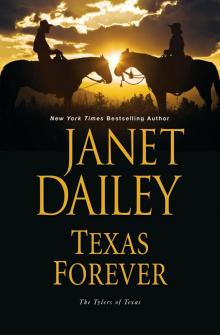 Texas Forever
Texas Forever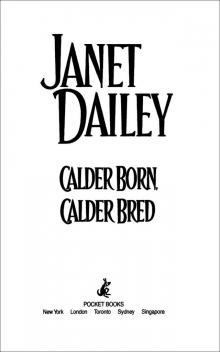 Calder Born, Calder Bred
Calder Born, Calder Bred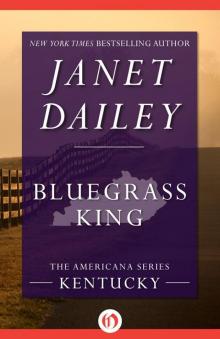 Bluegrass King (The Americana Series Book 17)
Bluegrass King (The Americana Series Book 17)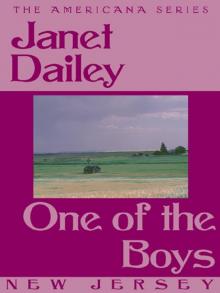 One of the Boys
One of the Boys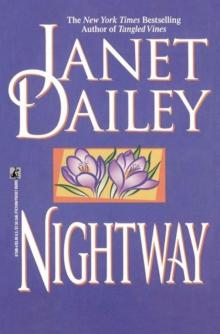 Nightway
Nightway This Calder Sky
This Calder Sky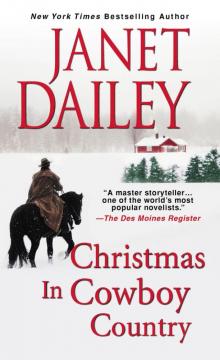 Christmas in Cowboy Country
Christmas in Cowboy Country The Widow and the Wastrel
The Widow and the Wastrel Separate Cabins
Separate Cabins Darling Jenny
Darling Jenny With a Little Luck
With a Little Luck The Thawing of Mara
The Thawing of Mara The Homeplace (The Americana Series Book 15)
The Homeplace (The Americana Series Book 15)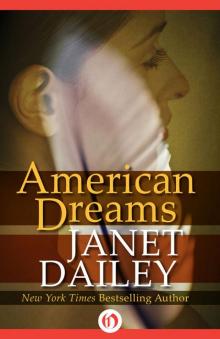 American Dreams
American Dreams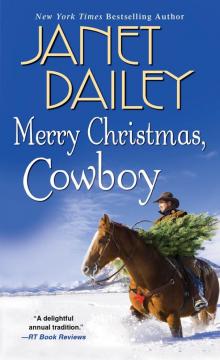 Merry Christmas, Cowboy
Merry Christmas, Cowboy Lord of the High Lonesome
Lord of the High Lonesome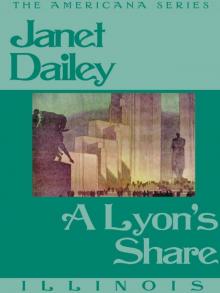 A Lyon's Share
A Lyon's Share After the Storm
After the Storm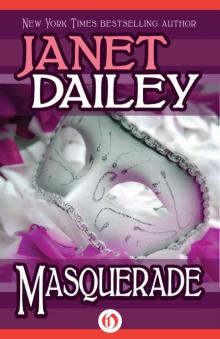 Masquerade
Masquerade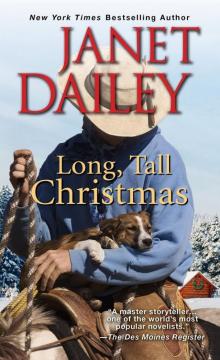 Long, Tall Christmas
Long, Tall Christmas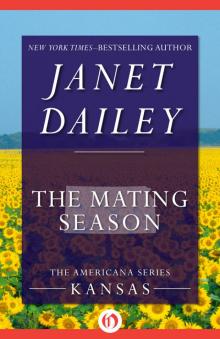 The Mating Season
The Mating Season To Tell the Truth
To Tell the Truth A Land Called Deseret
A Land Called Deseret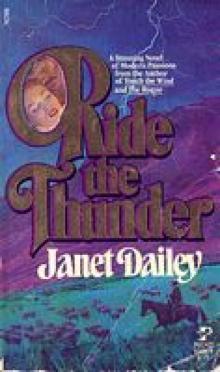 Ride the Thunder
Ride the Thunder That Boston Man
That Boston Man Wild and Wonderful
Wild and Wonderful Sonora Sundown: Arizona (The Americana Series Book 3)
Sonora Sundown: Arizona (The Americana Series Book 3)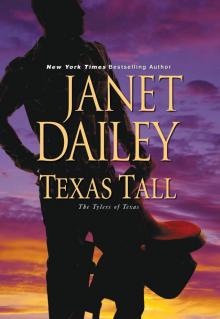 Texas Tall
Texas Tall Giant of Mesabi
Giant of Mesabi The Bride of the Delta Queen
The Bride of the Delta Queen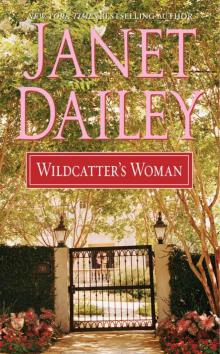 Wildcatter's Woman
Wildcatter's Woman Difficult Decision
Difficult Decision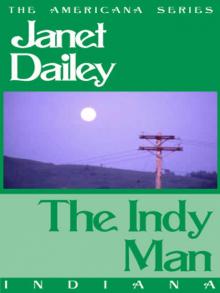 The Indy Man
The Indy Man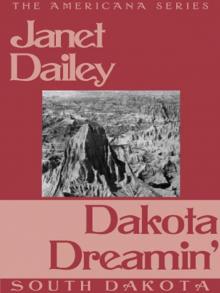 Dakota Dreamin'
Dakota Dreamin' Kona Winds
Kona Winds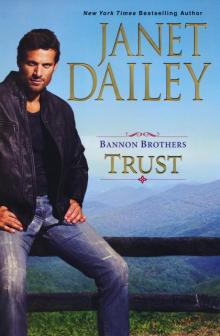 Bannon Brothers
Bannon Brothers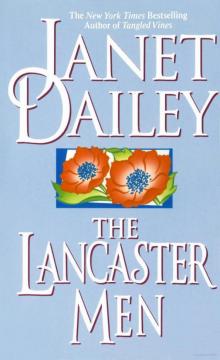 The Lancaster Men
The Lancaster Men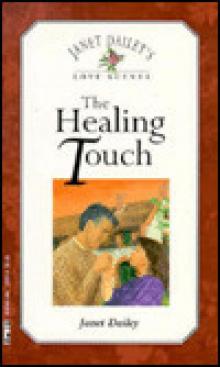 janet dailey- the healing touch
janet dailey- the healing touch Strange Bedfellow
Strange Bedfellow Leftover Love
Leftover Love Big Sky Country
Big Sky Country My Kind of Christmas
My Kind of Christmas You're Still The One
You're Still The One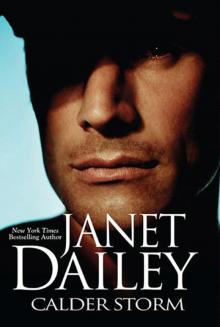 Calder Storm
Calder Storm Calder Pride
Calder Pride Low Country Liar
Low Country Liar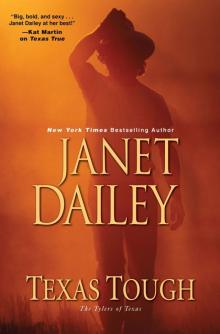 Texas Tough
Texas Tough Foxfire Light
Foxfire Light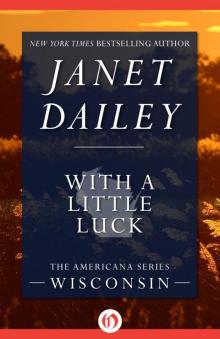 With a Little Luck (The Americana Series Book 49)
With a Little Luck (The Americana Series Book 49)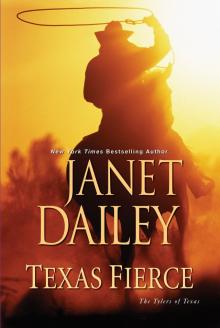 Texas Fierce
Texas Fierce Sentimental Journey
Sentimental Journey The Pride of Hannah Wade
The Pride of Hannah Wade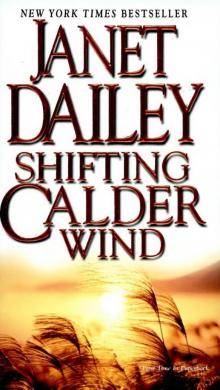 Shifting Calder Wind
Shifting Calder Wind Santa In Montana
Santa In Montana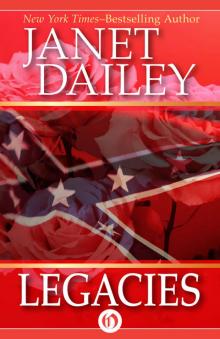 Legacies
Legacies Land of Enchantment
Land of Enchantment That Carolina Summer (North Carolina)
That Carolina Summer (North Carolina) Reilly's Woman
Reilly's Woman Refuge Cove
Refuge Cove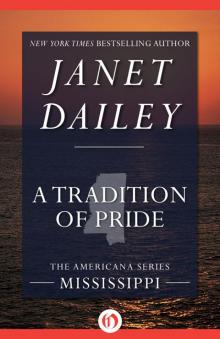 A Tradition of Pride
A Tradition of Pride Bed of Grass
Bed of Grass To Santa With Love
To Santa With Love Dangerous Masquerade
Dangerous Masquerade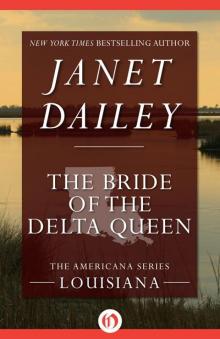 The Bride of the Delta Queen (The Americana Series Book 18)
The Bride of the Delta Queen (The Americana Series Book 18) Six White Horses
Six White Horses Valley of the Vapours (The Americana Series Book 4)
Valley of the Vapours (The Americana Series Book 4)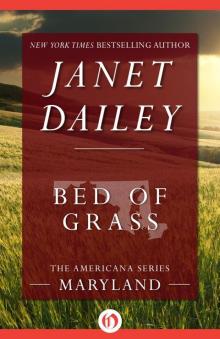 Bed of Grass (The Americana Series Book 20)
Bed of Grass (The Americana Series Book 20) The Indy Man (The Americana Series Book 14)
The Indy Man (The Americana Series Book 14) After the Storm (The Americana Series Book 6)
After the Storm (The Americana Series Book 6) Heiress
Heiress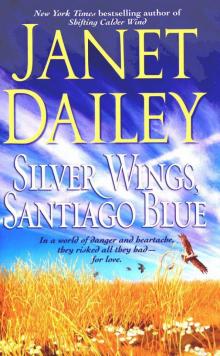 Silver Wings, Santiago Blue
Silver Wings, Santiago Blue The Rogue
The Rogue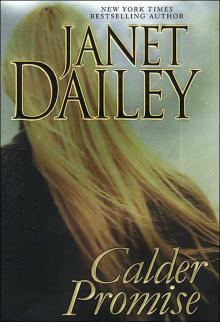 Calder Promise
Calder Promise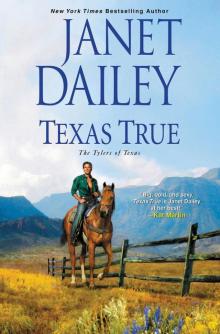 Texas True
Texas True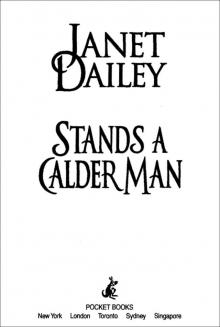 Stands a Calder Man
Stands a Calder Man Fiesta San Antonio
Fiesta San Antonio Fire and Ice
Fire and Ice For the Love of God
For the Love of God The Ivory Cane
The Ivory Cane Northern Magic
Northern Magic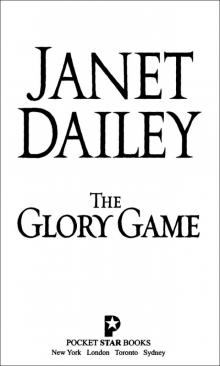 The Glory Game
The Glory Game The Homeplace
The Homeplace The Great Alone
The Great Alone Summer Mahogany
Summer Mahogany Tangled Vines
Tangled Vines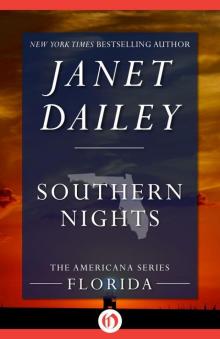 Southern Nights: Florida (The Americana Series Book 9)
Southern Nights: Florida (The Americana Series Book 9) Beware of the Stranger
Beware of the Stranger Big Sky Country: Montana (The Americana Series Book 26)
Big Sky Country: Montana (The Americana Series Book 26)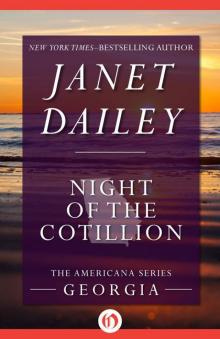 Night of the Cotillion: Georgia (The Americana Series Book 10)
Night of the Cotillion: Georgia (The Americana Series Book 10)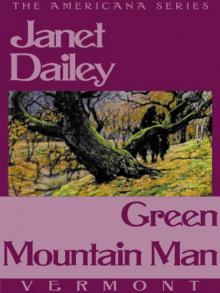 Green Mountain Man
Green Mountain Man For Mike's Sake
For Mike's Sake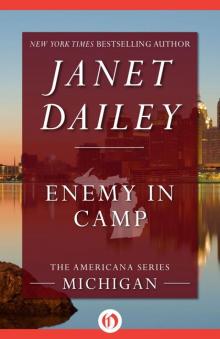 Enemy in Camp (The Americana Series Book 22)
Enemy in Camp (The Americana Series Book 22)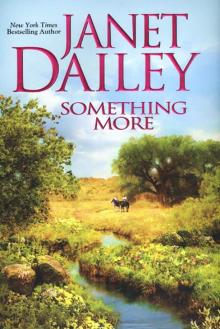 Something More
Something More Rivals
Rivals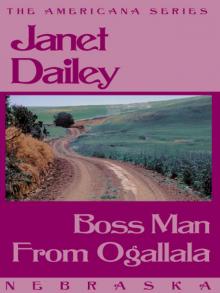 Boss Man from Ogallala
Boss Man from Ogallala Just a Little Christmas
Just a Little Christmas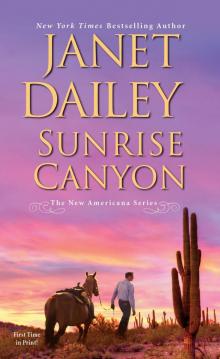 Sunrise Canyon
Sunrise Canyon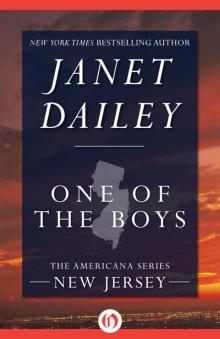 One of the Boys (New Jersey)
One of the Boys (New Jersey)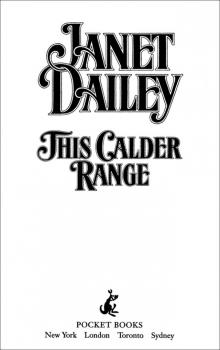 This Calder Range
This Calder Range Difficult Decision: Connecticut (The Americana Series Book 7)
Difficult Decision: Connecticut (The Americana Series Book 7)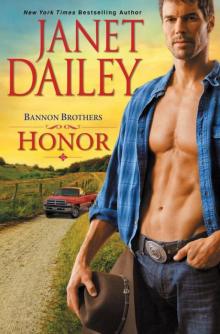 Honor
Honor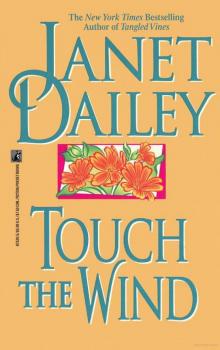 Touch the Wind
Touch the Wind Enemy in Camp
Enemy in Camp Show Me
Show Me No Quarter Asked
No Quarter Asked The Second Time
The Second Time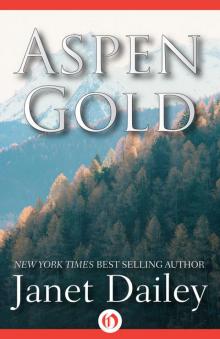 Aspen Gold
Aspen Gold Sweet Promise
Sweet Promise Triumph
Triumph Savage Land
Savage Land Fire and Ice (The Americana Series Book 5)
Fire and Ice (The Americana Series Book 5)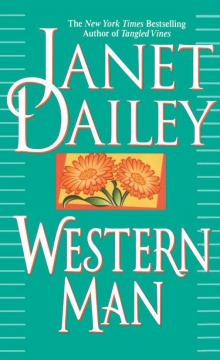 Western Man
Western Man The Traveling Kind
The Traveling Kind The Hostage Bride
The Hostage Bride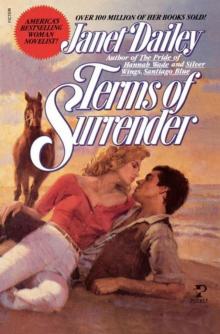 Terms of Surrender
Terms of Surrender Tidewater Lover
Tidewater Lover Illusions
Illusions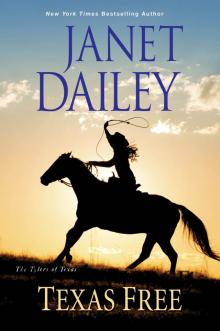 Texas Free
Texas Free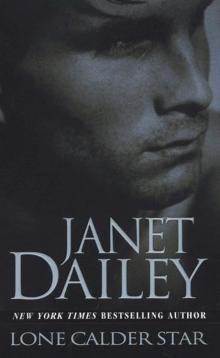 Lone Calder Star (Calder Saga Book 9)
Lone Calder Star (Calder Saga Book 9)